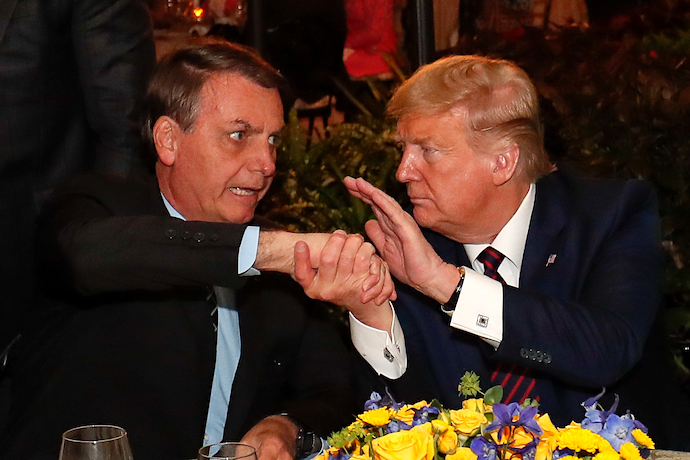The images were eerily similar: Insurrectionists were storming the halls of Congress, beating police officers who tried to fend them off, wreaking havoc in the offices of legislators, desecrating the very symbol of democracy itself—all in the name of an allegedly stolen election. The Big Lie hasn’t only taken hold of the Right in the US, but in Brazil as well. And so two days after the second anniversary of January 6th, the storming of the U.S. Capitol, supporters of the defeated Brazilian ex-president Jair Bolsonaro attempted their own coup—after he’d told them, again and again, that the election had been stolen by his progressive rival Luiz Inácio Lula da Silva.
It is, however, no coincidence that the two insurrections are so strikingly similar. The reason for that, according to political scientist Brian Klaas, is “authoritarian learning,” or the process of authoritarian systems feeding off each other, exchanging tactics and strategy (even those that fail). In his newsletter Klaas warns of dismissing the similarities between the two failed coup attempts:
“(…) it would be a mistake to think that the striking similarities between January 6th in Washington and January 8th in Brazil were produced by chance. There are networks of authoritarian political movements across the globe, populated by like-minded individuals, who will eagerly smash democracy in pursuit of seizing or retaining power. They work together.”
Indeed, while we don’t know enough about those who planned the Brazilian insurrection yet, the close ties between the American and Brazilian Right stand out. Bolsonaro and his allies have received ample support by the American right-wing in spreading their version of the Big Lie. Steve Bannon, Trump’s former advisor who has received a pardon from the former president, has spent months on his “War Room” podcast claiming the Brazilian election was stolen. Bannon, who called the Brazilian insurrectionists “freedom fighters” as the attack was underway, wrote on the right-wing platform Gettr: “The Criminal Atheistic Marxist Lula stole the Election and the Brazilians know this… now see Lula crackdown like all Communist dictators.”
And he wasn’t the only prominent voice on the American Right who cheered on the attackers. Ali Alexander, former member of the right-wing umbrella organization Council for National Policy and “Stop the Steal” organizer, wrote: “I do NOT denounce unannounced impromptu Capitol tours by the people,” telling the attackers “do whatever is necessary!” His calls for a military coup in Brazil began on the day of Bolsonaro’s defeat.
Bannon and former Trump advisor and White Nationalist Stephen Miller had previously spoken with Bolsonaro’s son Eduardo to advise his father’s team on how to proceed in the wake of the election defeat. Miller had even been briefly detained in Brazil in the aftermath of protests against Lula’s victory and questioned at the airport (he’d been in Brazil to attend CPAC.)
Bolsonaro’s son was in Washington for January 6th and met Trump at Mar-a-Lago earlier this year. To this day, his father has yet to officially concede his own lost election. The elder Bolsonaro is currently hiding out in Florida, staying at the home of a mixed-martial-arts fighter and eating KFC, in order to evade arrest in Brazil, while calls for Attorney General Merrick Garland to extradite him to Brazil have been getting louder from Democratic lawmakers and legal experts. Lula’s swift crackdown on the attackers stands in stark contrast to the U.S.’s hesitant, cautious response to the attack on its Capitol in 2020.
Matthew Tyrmand, a right-wing activist who serves on the board of Project Veritas, had previously called for the military to forcefully put Bolsonaro back into office, after he’d lost the election. Just last month Tyrmand was a guest at a gathering of White Nationalists, fascists and right-wingers hosted by the New York Young Republicans—where he mingled with, among others, two members of the European parliament who belong to the far-right Alternative für Deutschland (AfD). Fascist and authoritarian projects might be extremely nationalistic—but they still rely on a global support network of like-minded people. An example, perhaps, of authoritarian learning in real time.
One aspect that’s unfortunately been left out of the January 6 Committee’s 845-page end report, as Matthew Taylor and Bradley Onishi note here on RD, is the role religion and White Christian nationalism played in the US insurrection in 2020. Had this critical organizing aspect of the insurrection been highlighted, the images of Proud Boys praying, crosses being carried, and shofars being blown by those believing they’re engaged in spiritual warfare against forces of darkness would have been called to mind as we witnessed eerie parallels in the attack on Brazil’s democracy: Insurrectionists kneeling in prayer; a man wearing a shirt with the Bolsonaro slogan “God above all”; attackers chanting “God, fatherland, family and liberty.”
The make-up of Brazilian evangelicals may be different than in the US, but a majority support Bolsonaro and are united in reactionary, conservative ideas about sex and gender—hence the dogwhistle “family,” meaning a patriarchal family of man and woman, living in marriage, with children, similar to “family values” rhetoric in the US.
The prominence of religion in this latest Brazilian coup attempt highlights not only the danger and reach of White Christian nationalism, but also the rising prominence of pentecostals globally. While evangelical Christianity is declining, pentecostalism, and with it authoritarian and fascist-leaning theological concepts like dominionism, and potentially dangerous theological beliefs like spiritual warfare, are on the rise.
Like Republicans in the US, Bolsonaro’s supporters in Brazil were fed a steady diet of lies and misinformation, mixed with authoritarian Christian nationalism. Over time this created a permission structure, an impetus even, for political violence.
Of course the coup attempts in the US and Brazil were not identical. For one, the scope of the Brazilian attack on democracy was bigger than on that fateful day two years ago—Bolsonaro supporters not only attacked Congress, but also occupied the Supreme Court and the presidential residence—yet the violence resulted in no casualties (as far as we know).
Already, we see the attempted coup in Brazil being downplayed in some parts of the conservative press, as they did with the failed coups in the US and Germany—the attackers dismissed as “protesters” or buffoons who shouldn’t be taken seriously. Some of the most notorious fascists of history were laughed at and called buffoons before they rose to power. And even though the Brazilian coup attempt has failed (which, given the strong support Bolsonaro has in parts of the military and police, was far from certain), the danger has not yet been averted.
As a trained German historian, the violent potential of failed coups is all too present for me. They harbor the possibility of a martyr story developing; a myth that fuels future fanaticism. One thing is for certain: 2023 is going to be at least as dangerous for liberal democracies as 2022 was.





